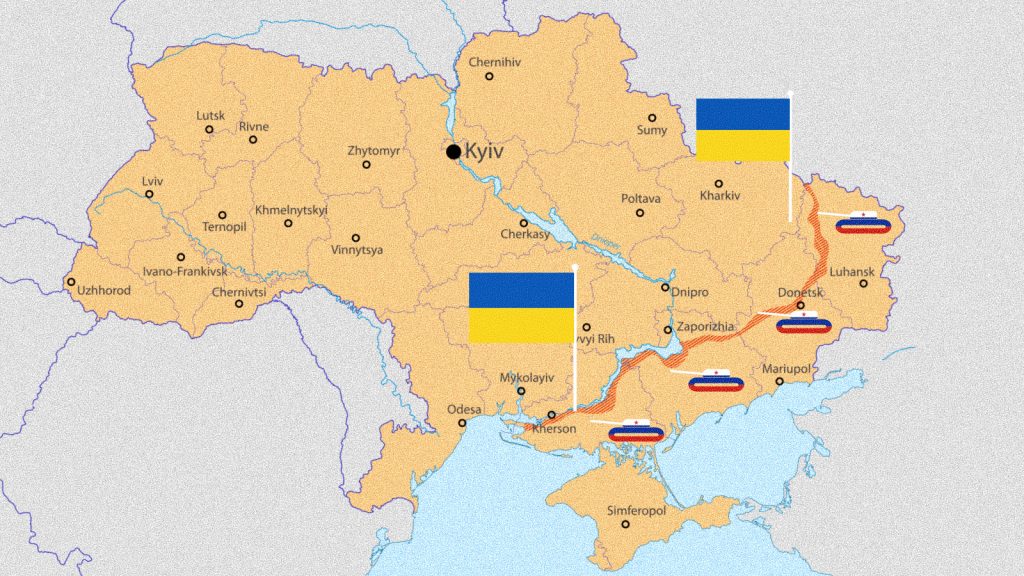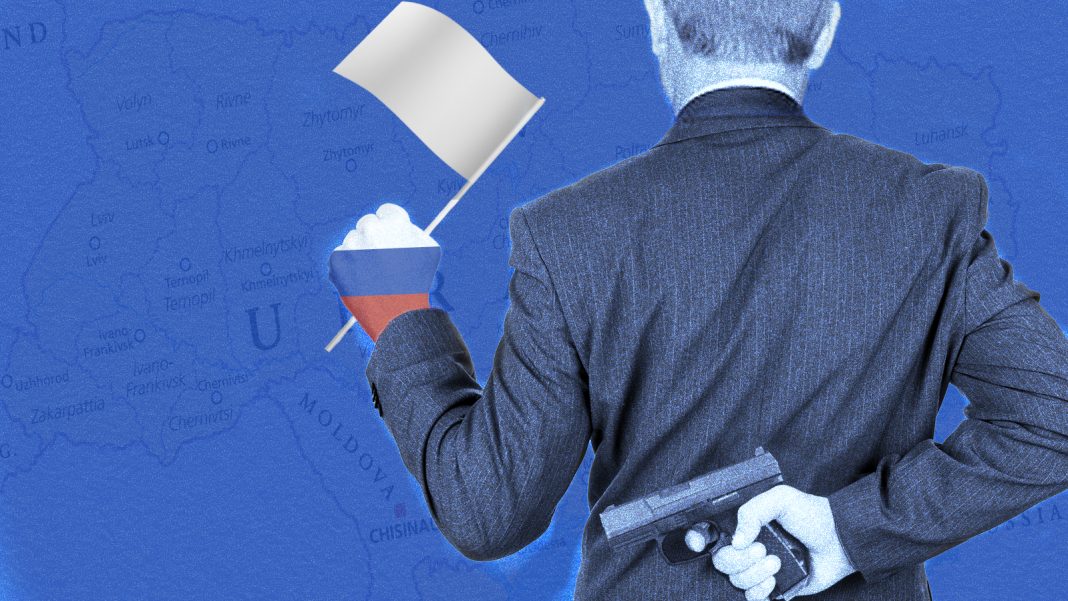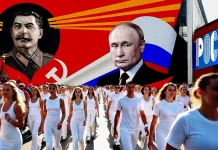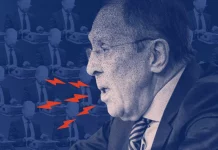Russia launched a full-scale invasion of Ukraine on 24 February 2022 and is using a poor euphemism for the war, calling it ‘a special military operation’, in an attempt to fool and manipulate the world. In fact, it is a real war. Since 2014, Russia has illegally annexed the Crimean peninsula and engaged in launching a war inside Ukraine’s Donbas region.
Russia is violating international law and Ukrainian territorial sovereignty and integrity. Ukraine has taken up self-defence provided for under the UN Charter. By waging this war, Russia is advancing imperialistic objectives. Russia now rejects Ukraine’s statehood, something which Russia recognised in December 1991 when the Soviet Union split into independent states.
War and negotiations
The Russian leadership has combined its full-scale war of aggression against Ukraine with a flow of messages which at face value sound like peace proposals. But when closely analysed, they are nothing short of demands for Ukraine to surrender and give up more of its territory. The Russian claim in a nutshell: ‘Look how peaceful we are, wanting to end the war, but the Nazis in Kyiv want to fight.’
This is a classic psychological warfare attempt to: (1) manipulate and reduce the fighting spirit among Ukrainians, (2) try to score quick goodwill points internationally and (3) split the European public with appeals to traditional peace movements or business circles wanting to engage with Russia in a ‘back to normal’ illusion.
With closer scrutiny and knowing Russia’s playbook, this is a classic trick: you create a problem and then expect to be rewarded for proposing to solve it, while imposing a solution on your own terms.
Moscow’s campaigns come in waves
Pro-Kremlin and Russian state outlets have been engaged to the maximum to spread the message of a peace-loving Russia even before its full-scale invasion of Ukraine on 24 February 2022.
In December 2021, Moscow tried to sugar-coat the obvious threat from the unprecedented build-up of military forces and equipment along Ukraine’s borders with a proposal for a ‘Treaty on Security Guarantees’ and an ‘Agreement on Measures to Ensure the Security of the Russian Federation’. These Russian draft proposals amounted to a de facto rollback of NATO to the 1990s, a shutdown of US security engagement in Europe, and Ukraine’s transformation into a self-service table for Russian security interests in what it considers its so-called ‘sphere of influence’.
Obviously, such an ultimatum was a non-starter. When coming from a seasoned player in international affairs like Russia, these ultimatums illustrated Russian intentions, which proved not to be serious attempts at negotiations. See our analysis here.
February 2022: surrender
Four days after the start of Russia’s full-scale invasion, the Kremlin took the next step. Helped by Belarus as host, Moscow fielded the political lightweighter former Minister of Culture Vladimir Medinsky to present the Kremlin proposal for a peaceful resolution (see also here). The talks developed over several rounds and involved the Ukrainian Minister of Defence. Again, the proposals where basically a demand for Kyiv to lay down its arms, surrender its territory in the east of Ukraine, and become a vassal under Moscow’s control. A few offerings (see here and here) of continued talks and limited humanitarian corridors could not hide that this was mafia-style pressure rather than serious negotiations.
March 2022: give up territory in the east and then surrender
In early March, when Russian army columns were stalled near Kyiv, the ‘negotiations‘ continued with maximalist demands and bombings of Ukrainian civilians. They were also an effort to buy time to regroup, refuel, and reload the Russian war machine.
A meeting held on 10 March in Ankara between Ukrainian Foreign Minister Dmytro Kuleba and his counterpart Sergey Lavrov to agree on a 24-hour ceasefire to evacuate citizens from the besieged city of Mariupol was rejected by Lavrov. The Russian minister claimed the ‘Russian military campaign was progressing as planned’ (read: we intend to occupy Kyiv and control Ukraine), a meaningless mantra later continually repeated. The diplomatic clash exemplified the maximalist Russian stubbornness which prevents any meaningful political contact. Lavrov had adopted this approach already, like in this interview of 2 March.
Pro-Kremlin outlets followed suit throughout the spring, using ‘progressing as planned’ as a handy way to dismiss all setbacks. The phrase even spread to neighbouring Belarus as illustrated by the main state news service Belta here. See also Lavrov’s comments in July reported in Izvestiya here.
During the spring and summer of 2022, so-called ‘peace initiatives’ dried out as fighting developed over ever-larger frontlines across Ukraine. As seen above, Vladimir Medinsky occasionally claimed ‘Moscow’s readiness for peace while Kyiv wants to fight’. Or claims by Putin or by Lavrov: ‘Ukraine has no freedom to decide negotiations, all is prevented by the US’. See also our database for numerous examples of this disinformation.
Autumn 2022: accept annexation and then stop fighting
After Russian retreats and military setbacks, especially around Kharkiv in the autumn of 2022, Russian demands have developed in a new, manipulative direction, emphasising inter alia the ‘need to recognise the Donetsk and Luhansk peoples’ quest for freedom’ which was often captured in the phrase ‘territorial reality’.
Another repeated line became: ‘Kyiv walks away from negotiations as soon as they become real’. Russian state-controlled media and pro-Kremlin outlets showed special enthusiasm when reporting on statements about negotiations from Western capitals or other voices inside EU. Any such statement was immediately portrayed as internal division and worked into an attempt to drive a wedge between Kyiv and the EU as illustrated here. All this activity was designed to portray Russia as a peace-seeker to international audiences.
As the same time, the debate back in Russia has constantly played with popular demands for the annihilation of Ukraine, even clear calls for genocide. Nuclear sabre-rattling has become frequent, for example here in connection with Putin’s order for mobilisation on 21 September 2022. Negotiations is not part of the domestic agenda.
September saw a repeat of the old trick from Crimea: quick, sham referenda held at gunpoint in occupied cities in Ukraine to claim ‘the people want to join Russia’. A formalistic circus in Moscow then followed as parliament members accepted the ‘popular will’ and Putin signed the formal incorporation of four new regions: the Donetsk, Luhansk, Zaporizhzhya, and Kherson republics into the Russian Federation. See our account here with pictures speaking for themselves. No matter the amount of pomp and circumstance, it remains another example of illegal annexations.
…But there is a problem of land
One important detail presents a new kind of problem to Moscow: the territorial extent of Russian-occupied regions in Ukraine is by purpose not clearly defined. Some adhered to the old mantra that annexed regions in their pre-war entirety should be considered Russian territory, repeating Lavrov’s assertion from the spring and creating the Orwellian logic that Ukrainian troops now occupy Russian land. Russian leaders try to muzzle discussions about a clear definition and the reason seems clear: significant parts of the Ukrainian oblasts of Donetsk, Luhansk, Zaporizhzhya, and Kherson are not under Russian control or occupation – see maps here.

The solution to this problem? Just demand more from Kyiv! Perhaps in connection with negotiations. Even if this sounds weird and out of sync with a more robust Ukrainian government ready to continue to defend its sovereignty and territorial integrity within its internationally recognised borders, this happened when Putin-mouthpiece and Federation Council speaker Valentina Matvienko voiced these new demands. She saw the ‘negotiation’ this way: ‘We’re willing to put an end to further military action in Ukraine, but on the terms offered by Russia’. Her comments echoed Russian politician Vladimir Medinsky approach from February last year.
Matvienko proposed the following steps. Before talks begin, Ukraine accepts the Russian annexation of the four regions (just like Kyiv should accept the Crimean peninsula as Russian). Then the actual talks about stopping military action could begin. But Matvienko blamed Kyiv for ‘refusing to face reality, especially after Zelenskyy’s visit to Washington.’ She again played on the popular Kremlin trope of ‘lost sovereignty’ that alleges the US controls the West, including Ukrainian leaders.
Enter Putin – a triumphant war
Later in December 2022, Putin repeated this approach, claiming his readiness to talk ‘when Kyiv accepts the new reality’. Setting as a precondition that Kyiv surrender all the regions currently illegally annexed by Russia before talks even begin is the best indicator that Putin and Russia are still not serious about any meaningful negotiations.
Putin’s sudden proposal for a truce around the Orthodox Christmas was nothing more than an attempt to gain a pause to regroup the Russian Armed Forces ahead of the winter period and to portray Ukraine as bloodthirsty for war with Russia. As this feint was clearly for international audiences, Russian units continued their bombardments.
Politics is the continuation of war
More signs indicate that Russian society under Putin is moving from an ‘under-siege’ bunker mentality into an atmosphere close to total war. For example, slogans proclaims that ‘Russia is not fighting Ukraine, but US / NATO / the West’ and ‘This a battle for Russia’s existential survival’, as in Putin’s New Year speech. Putin’s words carry a certain triumphalism and messianic exceptionalism: ‘It is tough – but it is our destiny’, ‘Russians are made for war’, – as if the current situation is a desired state of affairs. Such an approach to politics and negotiations twists the dictum of Carl von Clausewitz into something like: ‘politics has become the continuation of war’.
A classic proverb about the Soviet imperialist approach to negotiations says: ‘What is mine remains mine. What is yours we can talk about’. The current Russian calls for ‘negotiations’ takes the proverb even further: ‘What is yours should become mine. Full stop’.





